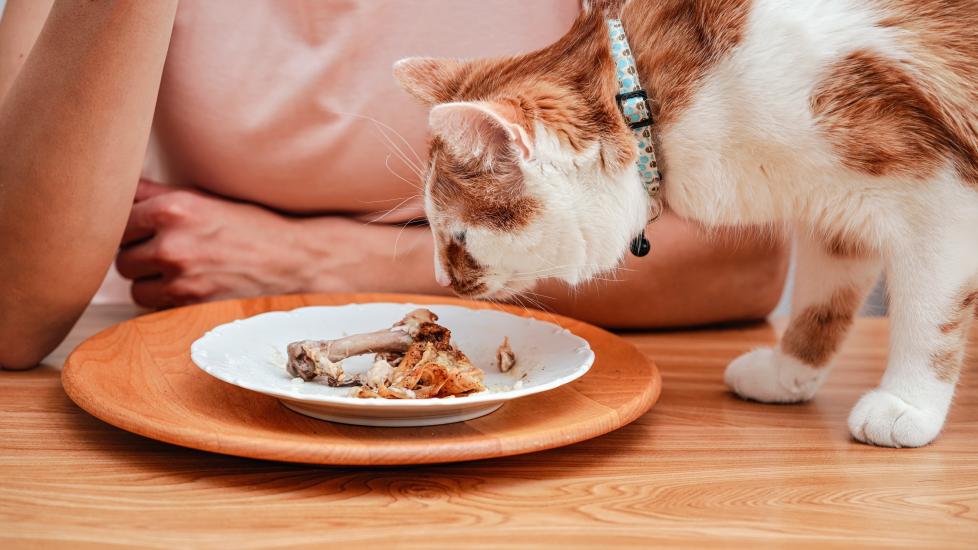Can Cats Eat Chicken?
Lubo Ivanko/iStock / Getty Images Plus via Getty Images
Chicken is commonly found on our dinner plates, but what about in your cat’s food bowl? Can cats eat chicken? And if so, how should it be prepared?
Here’s what you need to know before feeding chicken to your cat.
Is Chicken Good for Cats?
As obligate carnivores, cats are designed to eat animal-based meat products—and chicken fits the bill perfectly.
Nutritionally, chicken is almost an ideal food to help supplement your cats’ otherwise well-rounded commercial cat food diet. Chicken is high in protein, rich in essential amino acids and other nutrients, and most cats find it delicious.
Just take care to not overfeed your cat; chicken shouldn’t make up more than 10% of the calories your kitty eats per day. Overfeeding or exclusively feeding chicken to your cat can cause nutritional deficiencies.
Cooked Chicken
Spice-free baked or boiled chicken is an ideal treat to offer your cat if it’s completely plain (without any spices, butters, dressings, or extras). The bones should be removed before offering your cat this tasty snack, as these can cause a choking hazard.
Canned Chicken
Although canned chicken is typically safe for cats, it often contains more salt than what’s ideal and should be fed sparingly. Additionally, canned chicken may contain additional spices that should be avoided.
However, in a pinch, you could share a small amount of plain, unflavored, canned chicken that has been well rinsed to remove as much of the excess sodium as possible.
Fried Chicken
Fried chicken is one chicken product you shouldn’t share with your cat. Typically, fried chicken has a significant amount of spices, plus lots of breading and fat— all of which make it empty calories for your feline friend.
Chicken Nuggets
Much like fried chicken, chicken nuggets also tend to be dressed up with spices and breading and are high in fat. It’s best not to feed chicken nuggets to your cat.
Chicken Broth
Chicken broth is safe for cats, with a few caveats. Broths that have a significant amount of salt should be avoided, as well as those with added flavorings and spices that could prove toxic for your kitty.
However, you can safely make your own chicken broth to save for your cat. This allows you to avoid all of the harmful additives.
Can Cats Eat Chicken Bones?
Chicken bones are perhaps the most dangerous part of the chicken for your cat. They can become wedged in your cat’s mouth or throat, resulting in a choking hazard. Bones can also splinter, which can result in sharp pieces that damage the mouth, throat, and organs.
Chicken bones also have the potential for blocking your cat’s intestinal tract, resulting in a partial or complete obstruction. Chicken bones should always be off-limits to both cats and dogs.
Can Cats Eat Raw Chicken?
It’s safest for everyone to only feed properly cooked and prepared chicken to your cat.
Although cats can eat raw meats, this comes with potential hazards, including the danger of bacterial and parasite exposure to you and your cat. Salmonella and Campylobacter can both be found in raw chicken. And even if your kitty shows no signs of disease, these can be passed along to the humans in the household.
How To Safely Prepare Chicken for Cats
Chicken should be thoroughly and properly cooked—just as if it were for human consumption. But it needs to be prepared completely plain with no spices, butter, or breading.
Baking the chicken plain or boiling it works well for cats. Once cooked, allow the chicken to cool and remove the skin and bones. Cut it into small, bite-sized pieces and serve to your cat as a treat or as a topper in their food bowl.
How Much Chicken Can Cats Eat?
It’s very easy to overfeed chicken to your cat and upset the delicate balance of nutrition. Because of this, it’s important to keep chicken portions small.
A kitten under 6 months of age may have up to 2 teaspoons of plain, cooked chicken per day. A cat over 6 months of age may have up to 2 tablespoons of plain, cooked chicken per day.
Other Foods to Feed Your Cat
Other healthy foods to consider sharing with your kitty include plain and cooked turkey, beef, and a variety of fish products. All of these come with the same preparation guidance: cook the foods well, remove the bones and skin, and cut them into bite-sized pieces.
